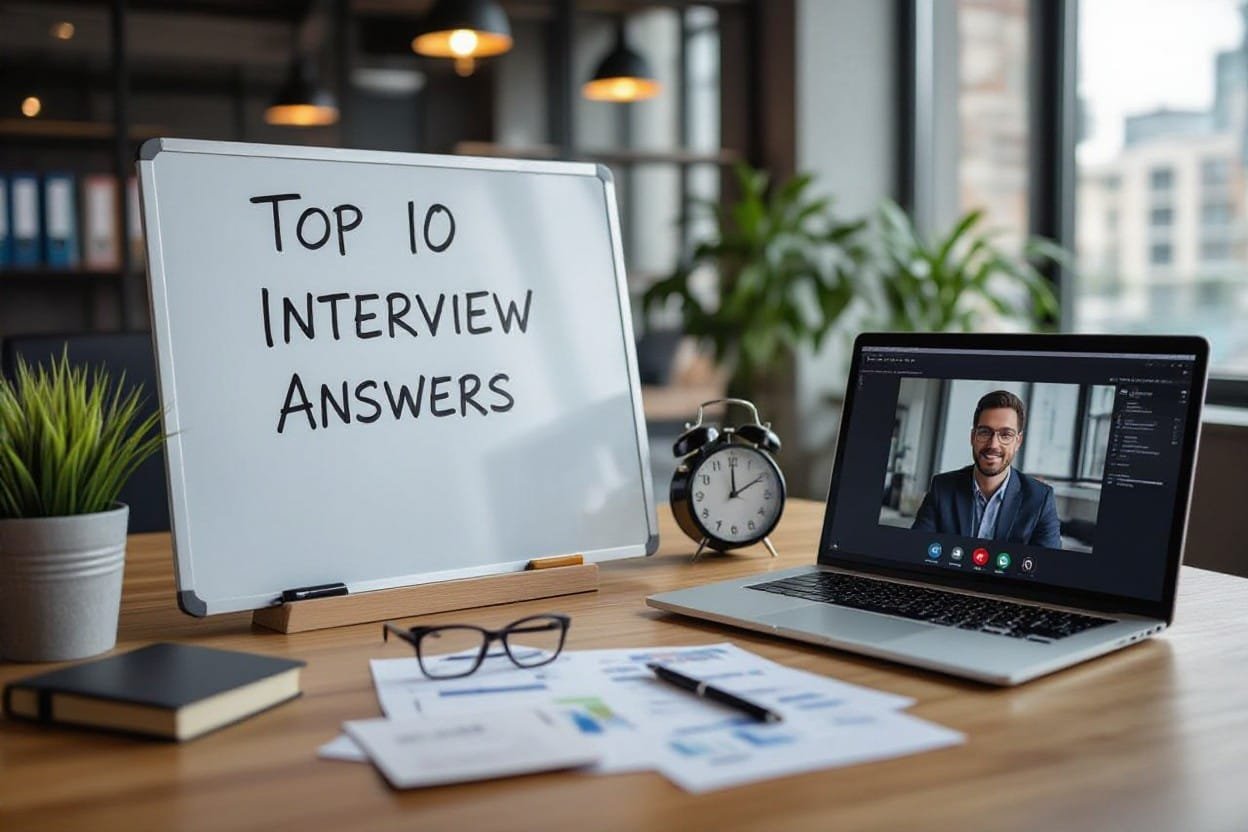The job interview question a PwC exec always asks to draw out a candidate’s ‘authentic self’
You probably noticed hiring conversations shifting toward personality and outside interests lately, and at Your Career Place we flag that trend as meaningful; see Joel Elveson’s Post for the spark behind it. So when a PwC exec asks about what you do outside work they’re fishing for your authentic self, not a resume bullet. Why does that matter? Be honest, not over-rehearsed – share what lights you up. At Your Career Place we coach you to answer with real life details that show who you are, not who you think they want.

Key Takeaways:
-
What does your hobby tell an interviewer about who you are beyond the job title?
It gives you a chance to show up as a whole person, not just a resume. Say something real about what lights you up – it doesn’t have to be flashy, just honest and specific.
Your Career Place sees this question as a window into values and curiosity, so use it to reveal a little personality.
-
How honest should you be about the boring or everyday stuff?
Be honest – people like relatability. If you binge audiobooks or spend weekends with your kids, say that; it’s fine, really it is.
Be real.
-
How do you prep without sounding like a robot?
Prep a few genuine examples so you can tell a short, natural story – not a script. Practice just enough that you feel confident, then let the conversation breathe.
Your Career Place recommends keeping it conversational, using small details that make your answer feel lived-in and authentic.
What’s the Big Deal About Authenticity in Interviews?
Authenticity beats polish every time. When you say something real about your life – like you listen to audiobooks, meditate, love photography or spend weekends with your kids – it paints a fuller picture, and that’s exactly why PwC’s Yolanda Seals-Coffield still asks about hobbies, per CNBC Make It. At Your Career Place we push you to be honest: prepare, but don’t rehearse so hard you sound canned – Seals-Coffield says over-scripted answers kill the chance to show who you really are.
Why Authenticity Matters
You give interviewers texture when you talk about what matters outside work – it signals values, curiosity and how you recharge. Seals-Coffield points out the substance isn’t as important as your ability to speak passionately and naturally; you don’t need a hero story, just something true. Your Career Place sees this often: candidates who share small, specific details spark follow-up questions and stronger rapport, which interviews reward.
The Impact on Hiring Decisions
Being authentic actually changes outcomes – hiring leaders use those personal glimpses to assess culture fit, resilience and communication style. Seals-Coffield says she’ll probe further when someone’s answer feels genuine, and that extra conversation often reveals teamwork, priorities or leadership potential. So yeah, your hobbies can tilt a decision – not because of the hobby itself, but because of what your story shows about you.
Digging deeper: when you’re real, interviewers notice patterns – consistency between your work examples and personal interests, emotional intelligence, and the ability to reflect. Seals-Coffield even accepts simple answers like “I’m with my kids” because it’s honest; at Your Career Place we teach you to pick one anecdote, add a specific detail, and practice it enough to be fluent but not robotic – that balance can be the difference between a polite nod and an invite to the next round.

What’s This Question That PwC Execs Love?
You sit in a glass conference room, interviewer smiles and asks what you do outside work – a simple prompt that still trips people up. Yolanda Seals-Coffield, US Chief People and Inclusion Officer at PwC, uses that line to draw out your authentic self; she wants honest stuff, not a hiking highlight reel. Say you listen to audiobooks, meditate, shoot photos or spend time with your kids and you’ll give a sense of the whole person. At Your Career Place we’ve seen those small answers reshape hiring conversations.
Breakdown of the Key Question
You’re being asked about hobbies and interests, not to pad your resume – pick one or two things you actually do and can talk about for 30-60 seconds. Be specific: explain how photography sharpened your attention to detail, or how audiobooks keep you curious, and avoid grand claims like daily hiking or nonstop community work. Tie that short anecdote back to a workplace trait – leadership, curiosity, time management – so interviewers see the person behind the CV.
Why It Works So Well
It works because it gives you space to show values, curiosity and communication – things a resume won’t capture, and interviewers like Seals-Coffield listen for those signals. When you describe a real interest you’re showing how you spend discretionary time, how you learn, what you prioritize, and that often leads to follow-ups that reveal thinking and temperament. Your Career Place recommends using this moment to be honest and specific, not polished to the point of sounding scripted.
For example, one candidate we coached at Your Career Place said they volunteered once a month and then described organizing a $12,000 community fundraiser that required budgeting, vendor negotiations and tight deadlines – that single story convinced the panel they could lead. Seals-Coffield also flags over-rehearsed answers; if you sound scripted you lose the personal detail that makes your story believable. Prep, sure – but keep it real.
How to Prep for This Question
About 70% of hiring managers say candidates rarely mention hobbies anymore, so you should use this gap to your advantage; Your Career Place suggests picking 2-3 real interests and preparing a short, honest anecdote that links them to a skill or value. Don’t over-script it, practice a loose narrative instead, and check this piece for context: The job interview question this PwC exec always asks to draw out a candidate’s ‘authentic self’.
Tips to Get You Ready
In one survey 64% of interviewers said candidates who mention a genuine hobby are more memorable, so you should choose interests that you actually do and can talk about for 30-60 seconds without sounding canned. Your Career Place recommends tying each interest to a skill – like patience from gardening or teamwork from rec soccer – and practicing a conversational, not robotic, delivery.
- Pick two honest hobbies, not five vague ones.
- Prep one short story that shows impact or growth.
- Link hobby to a workplace skill in one line.
- Practice aloud, then stop – less is more.
Perceiving your hobbies as narrative fuel rather than filler helps you come off authentic and relaxed, which is exactly what interviewers want.
Common Pitfalls to Avoid
Over 50% of hiring leaders say they can tell when answers are over-rehearsed, so you need to avoid sounding like you memorized a script; Your Career Place sees candidates lose points by exaggerating time spent on activities or using clichés like “I love traveling” with no detail. Stay specific, be brief, and don’t invent a persona you can’t back up.
Give concrete examples – say “I volunteer twice a month at the food bank, I coordinate shifts and tracked a 20% increase in donations” rather than “I give back a lot.” If you can’t support a claim with a quick detail or a small metric, toss it out – authenticity beats polish every time.
My Take on Showing Your True Self
Be specific, be human
In an interview when you’re asked about hobbies, picture telling Yolanda Seals-Coffield you listen to audiobooks and shoot photos on weekend walks – small, honest details that show who you are. Want to stand out? Be honest, not over-rehearsed; practice once or twice, then let the story breathe. At Your Career Place we suggest naming 1-2 activities and tying one to a skill or value, and avoid sounding scripted. Your Career Place sees authenticity win.
The Real Deal About Being Yourself in Interviews
What to Say
Being personal beats polished every time. Your Career Place notes PwC US Chief People and Inclusion Officer Yolanda Seals-Coffield asks about hobbies because she wants realness, not a heroic checklist; say you listen to audiobooks, meditate, love photography or – yes – you hang with your kids, and that’s fine. You want to show passion and how your experiences shaped you; over-practiced lines read as over-scripted and cost candidates jobs. At Your Career Place we coach you to prep, not prewrite, so your answer sounds lived-in, specific and human.
Are You Ready to Answer Like a Pro?
How to Prep Your Hobby Answer
Yolanda Seals-Coffield at PwC still asks about hobbies in interviews. Your Career Place says have a 30- to 60-second, honest anecdote ready – don’t overcook it. Mention specifics: you listen to audiobooks, meditate, shoot photos, or spend weekends with your kids. Practice once or twice so you sound natural, not scripted. Your Career Place recommends a one-line hook, a brief story, and a short takeaway about what it taught you. Sounds simple, right? It helps hiring managers get to your authentic self.
To wrap up
Upon reflecting on a quick anecdote when you told us about weekend pottery and suddenly lit up, you see why PwC’s question matters, because it surfaces your authentic self. At Your Career Place we coach you to answer honestly, not over-scripted, so your passions show how your life shaped you. Be prepared but natural, speak plainly, and you’ll connect. Want proof? See 5 executives share their go-to interview question. Your Career Place knows this works.
Thank you for visiting Your Career Place. Here are some related articles.














